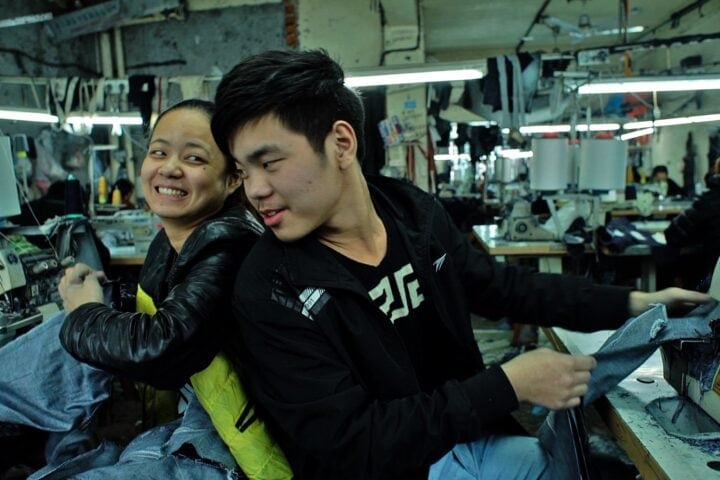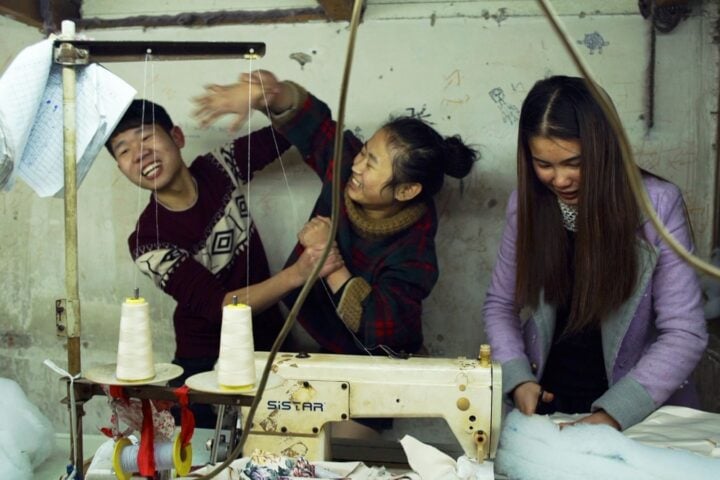Wang Bing’s Youth trilogy of documentaries about Chinese garment workers could have just as easily been named Three Colors. Like the titles that comprise Krzysztof Kieślowski’s triptych, each of Wang’s films is informed by a different color, though it’s primarily used to tint the title cards and chyrons that indicate a given sequence’s setting and subjects. The first installment, last year’s Youth (Spring), appropriately uses a lush green, while the subsequent Youth (Hard Times) went with a punishing deep red. The concluding entry, Youth (Homecoming), opts for something that works in more ambiguous ways, using a light blue that, depending on the viewer, could signal calm, harmony, or even sadness.
Youth (Homecoming) operates as something of an expansion of the concluding sequences of its two forebears. Youth (Spring) and Youth (Hard Times), which both run a full hour longer than the fleet (by Wang’s standards) 151-minute Youth (Homecoming), end with the garment factory workers returning to their home provinces from Zhili, the sole setting for almost the entirety of the first two parts. The effect of being released from the drone of Zhili’s workshops was cathartic, if not euphoric—a sudden expansion in visual scope that often saw the sequences’ central figures in contemplation, at a slight remove from the places they nominally call home.
Before Youth (Homecoming) spends its middle hour immersed in these locations, it begins with a different vantage point on the operations in Zhili, initially highlighting Shi Wei, a fabric cutter working in a village outside the hub of garment factories. As Wang weaves together his central figures for the first two-thirds of the film, including Shi’s friend’s sister, Dong Mingyan, he alights upon moments not typically found in the first two installments: wandering around the fields outside of town, cooking with proper ovens, playing cards. It isn’t until a full 30 minutes in that the camera even ventures into the now-familiar roar of the workshops for the first time.
After an arduous journey to the snowy mountains of Ludian in the Yunnan province, where Dong’s husband, Mu Fei, hails from, Youth (Homecoming) observes work of a very different sort from the mind-numbing sewing and harsh negotiations: falling back into the family fold, with all the conflicted feelings and labors that a holiday break entails. Where Zhili’s littered streets pointed in inexorable, seemingly never-ending straight lines, the mountains in Yunnan provide little guidance, an expanse that Dong and Mu trudge through, culminating in a rare (for this series) interview where Wang himself can be heard asking Dong about the state of her marriage.
This sequence leads directly to the most jubilant sequence in the entire trilogy: Shi Wei and his fellow worker Liang Xianglian’s wedding, a procession in the same mountainous district as Mu Fei’s residence. Full of bride-carrying ceremonies, silly string, and firecrackers, the sequence is transfixing on its own terms and as a crucial pivot point, offering a rosier view of matrimony and rural community than its preceding section that nevertheless contains a moment of disruption: Shi and Liang sitting on a bed, exhausted as they wait for the festivities to continue.
After winding its way through a few more segments of provincial life, including a 2016 Chinese New Year feast for the god of prosperity, Youth (Homecoming) eventually features Zhili in full force once more. This 40-minute section, which hurtles through the viewpoints of previously unseen persons, breaks with the preceding 100 minutes and the prior film’s immersion within fewer narratives. It thus resembles the expansive canvas of Youth (Spring), a structural gambit which reinforces the ways in which this work feels both standalone and summative.
The Chinese character rendered here as “homecoming” is “guī,” which translates more accurately to “return,” a sentiment that’s deliberately ambiguous. Throughout his trilogy, Wang Bing’s modus operandi has been expansion through repetition, a recursive exploration of similar spaces that nevertheless exhibits differing emotions, concerns, and personalities. In doing so, and in spending so much time with his remarkable, downtrodden subjects, he does a great deal to reconfigure what the concept of home means; utilizing previous structural strategies before breaking away once again perfectly embodies the dynamic of continual reconsideration endemic to their experiences. As indicated by the combination of a final sequence in which another worker returns home in 2019 and the last shot of this nine-hour endeavor, to return is a never-ending process, full of sadness yet tinged with hope.
Since 2001, we've brought you uncompromising, candid takes on the world of film, music, television, video games, theater, and more. Independently owned and operated publications like Slant have been hit hard in recent years, but we’re committed to keeping our content free and accessible—meaning no paywalls or fees.
If you like what we do, please consider subscribing to our Patreon or making a donation.





